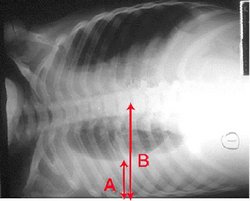Pleural effusion
Pleural effusion is a medical condition where fluid accumulates in the pleural cavity which surrounds the lungs, making it hard to breathe. more...
Four main types of fluids can accumulate in the pleural space:
- Serous fluid (hydrothorax)
- Blood (hemothorax)
- Lipid (chylothorax)
- Pus (pyothorax or empyema)
Causes
Pleural effusion can result from reasons such as:
- Cancer, including lung cancer or breast cancer
- Infection such as pneumonia or tuberculosis
- Autoimmune disease such as lupus erythematosus
- Heart failure
- Bleeding, often due to chest trauma (hemothorax)
- Low oncotic pressure of the blood plasma
- lymphatic obstruction
- Accidental infusion of fluids
Congestive heart failure, bacterial pneumonia and lung cancer constitute the vast majority of causes in the developed countries, although tuberculosis is a common cause in the developing world.
Diagnosis
In states of excess accumulation, pleural fluid can be sampled and evaluated to determine what disease state may be causing it. This can be sampled through a thoracentesis, where a needle is inserted through the back of the chest wall and into the pleural space. The evaluation consists of:
- Gram stain and culture - identifies bacterial infections
- Cell count and differential - differentiates exudative from transudative effusions
- Cytology - identifies cancer cells, may also identify some infective organisms
- Chemical composition including protein, lactate dehydrogenase, amylase, pH and glucose - differentiates exudative from transudative effusions
- Other tests as suggested by the clinical situation - lipids, fungal culture, viral culture, specific immunoglobulins
Read more at Wikipedia.org



